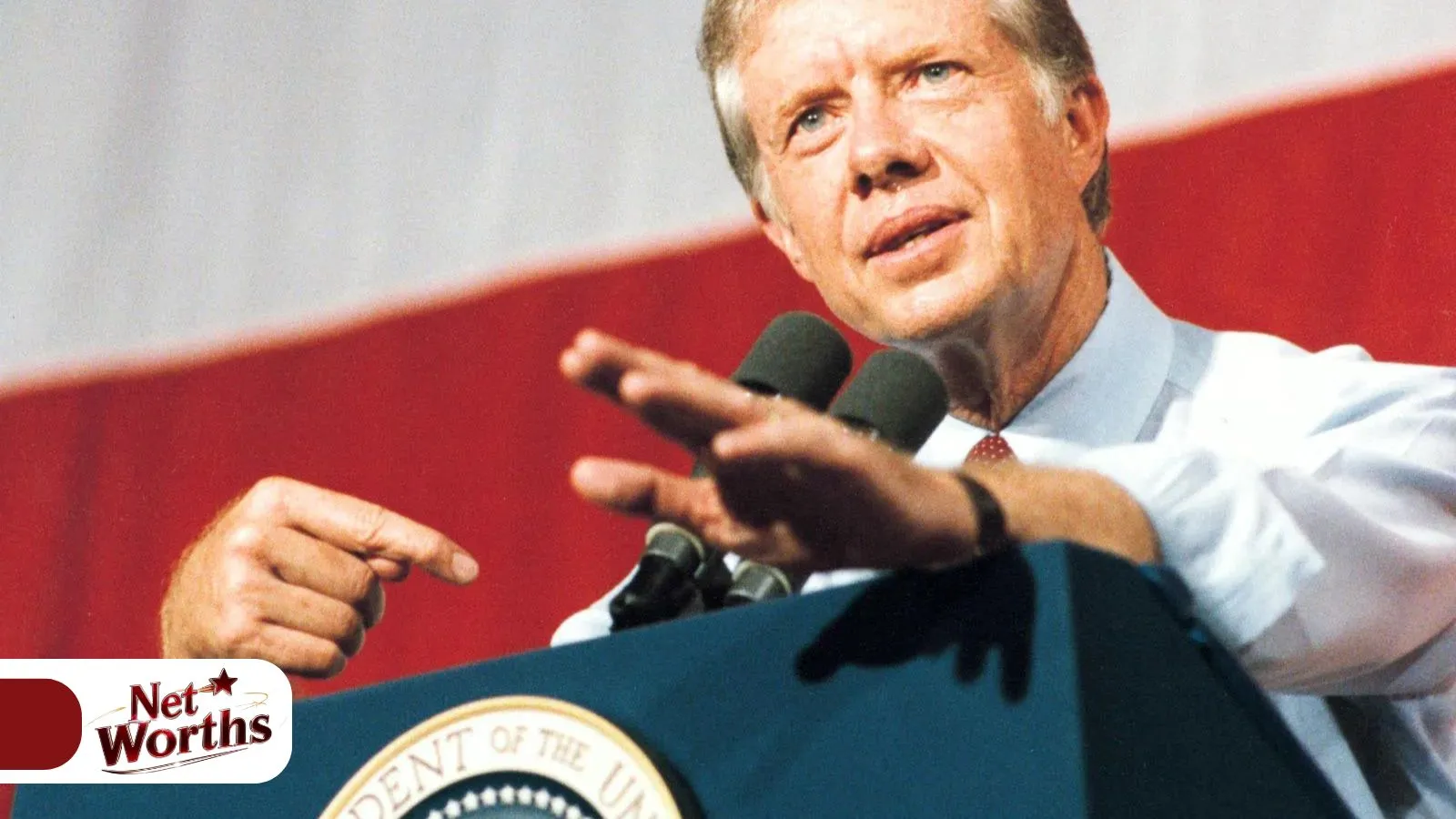Jimmy Carter, the 39th President of the United States, is a figure whose legacy extends far beyond his time in office. From his early days as a peanut farmer to his post-presidential humanitarian efforts, Carter’s life is a testament to public service, dedication, and integrity.
This blog post delves into Jimmy Carter’s net worth, career achievements, personal life, and lasting impact on both national and international stages.
Early Life and Background
Childhood and Family
James Earl Carter Jr. was born on October 1, 1924, in Plains, Georgia. He grew up in a modest family, with his father, James Earl Carter Sr., being a successful local businessman and his mother, Lillian Gordy Carter, a registered nurse. The values of hard work and community service were instilled in Carter from a young age.
Education and Early Interests
Carter attended Plains High School and later enrolled in the Georgia Southwestern College. He transferred to the Georgia Institute of Technology before securing a place at the United States Naval Academy in Annapolis, Maryland, where he graduated in 1946. Carter’s early interest in engineering and naval service shaped his disciplined and analytical approach to problems throughout his life.
Military Service
Naval Career
After graduating from the Naval Academy, Carter embarked on a promising career in the U.S. Navy. He served on submarines and was selected for the nuclear submarine program under Admiral Hyman Rickover. Carter’s naval career was distinguished by his technical expertise and leadership skills.
Transition to Civilian Life
In 1953, following the death of his father, Carter left the Navy to take over the family peanut farm in Plains. This transition marked the beginning of his involvement in local politics and community affairs.
Political Career
Early Political Involvement
Carter’s political career began with his election to the Georgia State Senate in 1962. He served two terms and quickly gained a reputation for his dedication to civil rights and governmental reform. His success at the state level paved the way for his gubernatorial campaign.
Governor of Georgia
In 1970, Carter was elected as the 76th Governor of Georgia. His tenure as governor was marked by progressive policies, including the desegregation of Georgia’s schools and government offices. Carter’s focus on civil rights and efficiency in government garnered national attention.
Presidential Campaign
In 1976, Carter launched a successful campaign for the presidency, positioning himself as a Washington outsider who could restore trust in government following the Watergate scandal. His campaign emphasized honesty, transparency, and human rights.
Presidency (1977-1981)
Domestic Policies
As president, Carter faced numerous challenges, including a struggling economy and an energy crisis. His administration implemented policies aimed at reducing inflation and unemployment, promoting energy conservation, and improving environmental standards. Notable domestic achievements include the creation of the Department of Energy and the Department of Education.
Foreign Policies
Carter’s foreign policy focused on human rights and diplomacy. His most significant achievement was the Camp David Accords, which brokered peace between Egypt and Israel. He also oversaw the return of the Panama Canal to Panama and normalized relations with China.
Challenges and Controversies
Carter’s presidency was not without difficulties. The Iran hostage crisis, in which 52 American diplomats were held hostage for 444 days, and the Soviet invasion of Afghanistan were significant challenges. Additionally, economic issues, including high inflation and unemployment, affected his popularity.
Post-Presidency
Humanitarian Efforts
After leaving office, Carter dedicated himself to . The center’s initiatives have helped eradicate diseases like Guinea worm disease and promoted free and fair elections worldwide.
Nobel Peace Prize
In 2002, Carter was awarded the Nobel Peace Prize for his decades of work advancing peace and human rights. The Nobel Committee recognized his efforts in international conflict resolution, democracy promotion, and public health initiatives.
Continued Advocacy
Carter remains active in various humanitarian causes. He has been involved in Habitat for Humanity, building homes for those in need, and has continued to speak out on issues such as public health, climate change, and human rights.
Financial Status and Net Worth
Estimated Net Worth
As of 2024, Jimmy Carter’s estimated net worth is around $10 million. His wealth comes from various sources, including book royalties, speaking engagements, and his government pension.
Major Income Sources
Carter’s financial standing is supported by multiple revenue streams:
| Source | Description |
| Book Royalties | Earnings from numerous published books, including memoirs and political works. |
| Speaking Engagements | Fees from public speaking events and lectures. |
| Government Pension | Pension received as a former U.S. president. |
| Business Ventures | Income from family business and investments. |
Financial Management
Despite his relatively modest net worth compared to other former presidents, Carter is known for his frugality and wise financial management. He has lived modestly and invested his earnings in charitable causes.
Personal Life
Family and Relationships
Jimmy Carter married Rosalynn Smith on July 7, 1946. The couple has four children: John William “Jack” Carter, James Earl “Chip” Carter III, Donnel Jeffrey “Jeff” Carter, and Amy Lynn Carter. Their marriage, spanning over seven decades, is marked by mutual support and shared values.
Health and Wellness
In recent years, Carter has faced health challenges, including a battle with cancer. Despite this, he has remained active, continuing his humanitarian work and teaching Sunday school at his local church.
Hobbies and Interests
Carter enjoys various hobbies, including painting, woodworking, and fly-fishing. He is also an avid reader and continues to write books on diverse subjects.
Legacy and Impact
Political Legacy
Carter’s presidency is often viewed through a mixed lens, but his post-presidential humanitarian efforts have significantly enhanced his legacy. He is respected for his integrity, commitment to human rights, and dedication to public service.
Humanitarian Contributions
The Carter Center’s work has had a profound impact on global health and democracy. Carter’s efforts in eradicating diseases, promoting peace, and advocating for human rights have earned him international acclaim.
Public Perception
Public perception of Carter has evolved over time. While his presidency faced criticism, his post-presidential work has earned widespread admiration. Carter is often seen as a model of how former presidents can continue to contribute to society.
Conclusion
Jimmy Carter’s life is a remarkable journey from humble beginnings to the highest office in the land and beyond.
His dedication to public service, both as president and in his post-presidential years, reflects a deep commitment to improving the lives of others.
Carter’s legacy is one of integrity, compassion, and unwavering dedication to human rights and humanitarian causes.










